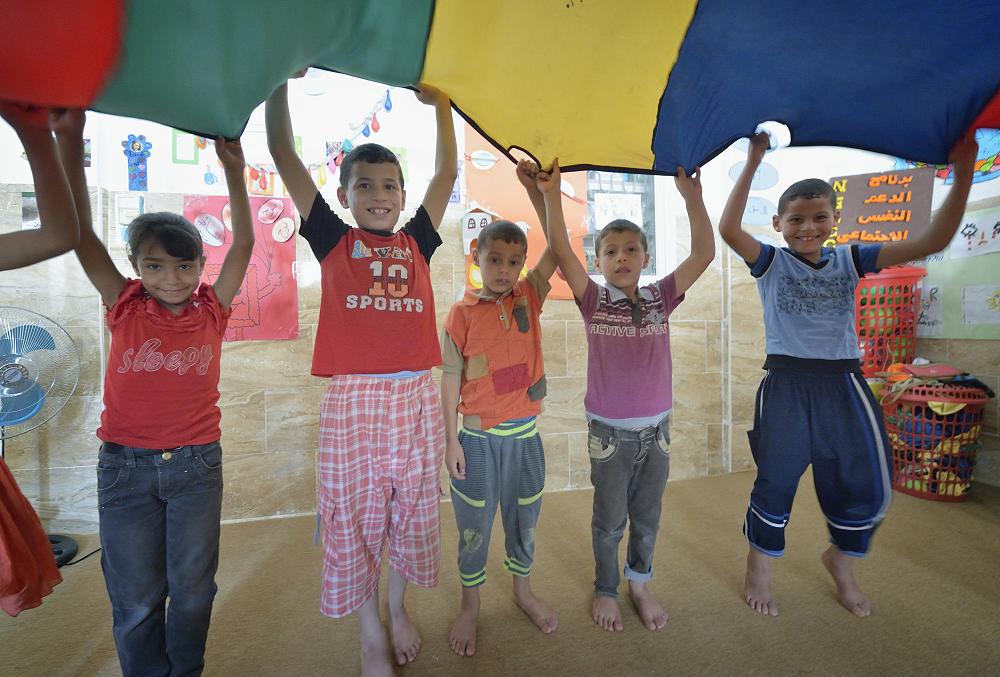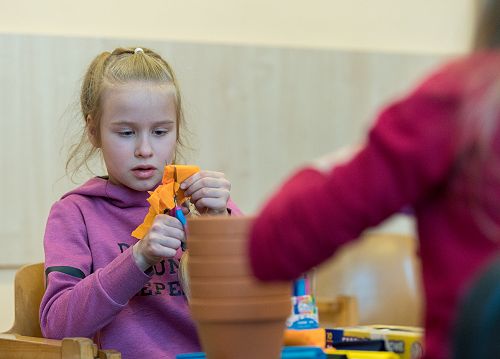
Everyone does what they can to help.
Living through a natural disaster or conflict situation can cause lasting trauma. Psychosocial support can be as important as providing food and shelter to survivors. Community-led programmes backed by professional staff are part of the humanitarian response supported by Christian World Service.
When Doxa comes through the door, the children race to greet him. He is a big dog who is used to being hugged by children in Berehove, Ukraine. Trained as a therapy dog he has helped hundreds of children cope with the trauma they have experienced during the war.
Refugee children like Marianna in Poland, have found their own healing in the child-friendly spaces created by the Lutheran World Federation.
In Gaza, children who wet their beds or wake with nightmares every night, find some reprieve in group therapy sessions run by the Department of Service to Palestinian Refugees.
“We know that local people know their communities best. In places like South Sudan, where the people have lived with violence and conflict all their lives, our partner the Mission for Sustainable Advancement welcomes people seeking refuge. They listen to their stories and give practical help so they can provide for their families,” says Murray Overton, National Director.
Community-based psychosocial support recognises that people need social interaction and mental stimulation for their wellbeing. The way people’s basic needs are met after a disaster or during a conflict can affect their recovery. People want to feel safe and secure as well as have the freedom to meet their religious and social needs. Outside organisations need to build on the resources of the community and not create future dependency.
Barbara Körozsi takes Doxa to dog therapy sessions at a local shelter run for people displaced by the war in Ukraine. The shelter is run by Hungarian Interchurchaid, a member of ACT Alliance (Action by Churches Together). In a few months, Doxa has helped many children.
“There was one family who arrived here from Severodonetsk,” Barbara recalled. “When they arrived, their two children were afraid of any noise that sounded like the war. Thunder caused anxiety in them. A psychologist from Kyiv tried to help but could not get very far with them. The children wouldn’t go anywhere without their mother.
“When they started to come to the programme with my dog, the children began to get more and more open. They now come to the programme without their mum. They don’t cry but play and have fun,” she continued.
Donations to the Ukraine Appeal will support Child Safe Places and Women Safe Places in Poland. Choosing A Parachute at gift.org.nz will assist traumatised children living in Gaza.
“In time most people rebuild their lives. Children go back to school. Parents can repair homes and replant their gardens. Some will need specialist support. With long-lasting conflicts and more intense natural disasters this is becoming harder. Your donations to our emergency appeals are so important,” Murray adds.
ACT Alliance Guiding Principles for Community Based Psychosocial Support
1. Promote the basic rights and dignity of women, men, girls, and boys, without discrimination, avoiding unnecessary distress, fear, and pain (e.g., physical, emotional and spiritual).
2. Include social and psychological considerations in all ACT work sectors (e.g., water and sanitation, livelihoods, shelter, health and security).
3. Build on community self-help strategies, promoting community ownership and control over resources using participatory processes of engagement and decision-making.
4. Promote the return to the optimal functioning of affected communities and individuals through their involvement in social activities and gatherings within local structures such as schools, community centres, churches, mosques, and local organisations.
5. Recognise and encourage the community’s belief in its own capacity to make change and to protect their overall wellbeing by building on their own resources.
6. Promote positive communal healing practices, emphasising family and community support structures to address individual and collective needs.
7. Address people’s spiritual needs to maintain good mental health and a feeling of belonging or connectedness.
8. Enhance a community’s resilience and hope for long term recovery and sustainability by nurturing their capacity for growth.
Gallery

